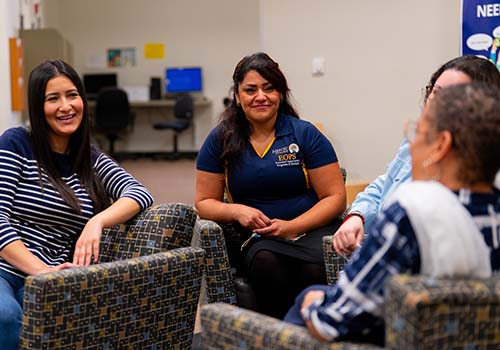 It began easily enough.
It began easily enough.
A group of Merced College students had gathered on Zoom last summer to participate in an improvement program. The single parents were all recharging their batteries before the fall semester.
Towards the end of the three-day event, EOPS/CARE Coordinator Nora Martinez, CalWORKS Student Support Coordinator LaDenta Smith and keynote speaker Sade Burrell asked the students: What else can we do to help you and your children?
“That’s when we started talking about a mom group where we could support each other outside of class,” said Cerissa Martinez, 32, an Early Childhood Education and Psychology major with a 10-year-old son named Adrian.
That is how Motivating Other Mothers (M.O.M.) was born.
“[The meetings are] their time to vent,” Smith said. “They share things that they wouldn’t share anywhere else.”
The M.O.M. group, with 10 to 15 regulars, are all CARE and CalWORKS program participants who receive services as low-income, single parents.
Why do they need their own space in addition to the services?
“Their issues are different from other students,” Nora Martinez said. “They have school, work, motherhood, childcare. They wanted a place where they could feel safe expressing their concerns, emotions and stress.”
Martinez and Smith organize activities they hope will spark organic conversations about those unique struggles.
“When we first started, I thought we’d just talk about issues,” said Serina Watts, 40, a Photography and Digital Arts major with a 5-year-old daughter named Iyanah. “It’s not that at all. The activities force us to look at who we are and who we want to be. … That hour is my time to breathe.”
For example, participants have painted their feelings on canvas. They’ve chatted with an adjunct counselor about love languages. Prior to Thanksgiving, they shared things for which they were grateful, and were free to feel grateful for things besides their children.
“It reminded them, they’re not just moms, but human beings with their own needs and emotions,” Nora Martinez said.
Throughout the fall, the mothers also read and journaled about a book called Let That Sh*t Go. The mothers got into that one, Smith said.
“They’re bonding,” she said. “It’s a place where they feel safe. They don’t judge each other about anything they’re saying or doing.”
The women share information, thoughts and reassurance.
“Getting help and feedback from a peer is different from hearing it from your parents or someone else,” Watts said. “Just the experience of watching other people like me — it’s like we’re raising each other.”
Student-parents make up 22% (3.8 million) of all college students in the U.S., according to a 2019 article published by the Institute for Women’s Policy Research.
Those student-parents are often the first in their families to try college. Their families support them, but may have no idea how to help with registration, financial aid or troubles with professors.
The mothers feel isolated. They find it hard to ask for help, even if it is earmarked for them. While up to 120 students use CARE and CalWORKS at Merced College, Smith and Nora Martinez say there are many more who don’t.
Some won’t leap over the stigma of accepting government aid. Cerissa Martinez said the M.O.M. crew has helped her shrug that off and gain confidence in how she raises her son.
“Just hearing the words — welfare, single parent, cash aid — can keep people away,” she said. “But to anyone who feels that way, all it takes is one step into the building.”
Nora Martinez said the M.O.M. group is succeeding because the mothers feel like they belong there.
During a recent meeting, the group met and played Millennial Loteria. The Spanish-language game is akin to Bingo, except updated for millennials with squares like “Student Debt” and “La Selfie.”
While drinking hot champurrado and eating pan dulce, Cerissa Martinez said the game got louder and funnier as time went on. Her stress decreased as the event went on.
“I realized, ‘Damn, we’re really bonding over laughter, jokes and sarcasm,’” she said. “Sometimes us moms need a place where we can laugh and not be judged for it.”
Nora Martinez said the issues the mothers in the group deal with would “blow your mind.”
“Yet they’re surviving,” she said. “They’re so strong.”
They’re empowered by the support and the access to services. They help each other. They have an outlet. They want to give others the same.
“The best thing I can say to anyone who isn’t in the M.O.M. group right now is to just come check it out,” Watts said. “Don’t be shy.”
